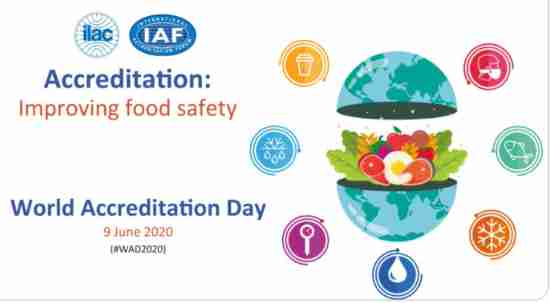Food safety has been chosen as the theme of World Accreditation Day in June.
The global annual initiative on June 9, established by the International Laboratory Accreditation Cooperation (ILAC) and International Accreditation Forum (IAF), promotes accreditation including some related to food safety issues.
This year’s theme focuses on how such work supports food safety and boosts the confidence of consumers, suppliers, purchasers and specifiers in the quality and safety of food.
Accreditation helps ensure competent and impartial inspection, certification and testing services in local, national and international food chains. World Accreditation Day 2019 looked at the role of accreditation in supply chains.
Layer of assurance
In a joint statement, Xiao Jianhua, chair of IAF, and Etty Feller, head of ILAC, said accreditation helps improve food safety.
“It does this across the whole of the food supply chain from farm to fork, through food production, processing and packaging, storage and transportation, to retail and catering, helping build layers of assurance in the supply chain,” they say.
“Accreditation has a crystal-clear objective: it aims to assure businesses, end users and regulators that a conformity assessment body (CAB), such as a certification or inspection body, testing, calibration or medical laboratory, has the required technical competence and operates impartially. This competence is assessed by accreditation bodies against international standards and requirements.”
There is an international aspect to food and water production as ingredients and product parts may come from several countries, requiring more proofs of conformity to meet requirements of importing economies.
Accreditations awarded by IAF members include food safety schemes such as FSSC 22000, Global GAP Integrated Farm Assurance (IFA), International Featured Standards (IFS), and ISO 22000.
Close to World Food Safety Day
The Food and Agriculture Organization of the United Nations (FAO), World Health Organization (WHO) and World Trade Organization (WTO), have previously highlighted the human impact of foodborne infections.
Jianhua and Feller said accreditation aims to support a reduced burden of disease through improving the performance of organizations in the food supply chain.
“Accreditation is used across the globe to help meet this goal: from the use of accredited certification in Australia through the PrimeSafe scheme for meat and seafood supply; to the European Union using the accreditation of laboratories to support food security in Europe; to accredited inspection to help commercial catering establishments deliver safer food in France.”
World Accreditation Day 2020 comes just two days after the second World Food Safety Day on June 7. A video for the former by ILAC and IAF can be viewed here.
World Food Safety Day (WFSD) will draw attention and action to help prevent, detect and manage foodborne risks, contributing to food security, human health, economic prosperity, agriculture, market access, tourism and sustainable development.
(To sign up for a free subscription to Food Safety Website, click here.)

